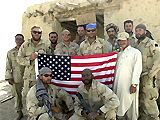Costs of War: Army Families Suffer
By Shaun Waterman for ISN
external pageThe studycall_made, conducted by the RAND Corp, shows that repeated, longer deployments for US military personnel make it more likely that their children will suffer behavioral, emotional and social problems - highlighting the strain military families continue to bear after eight years of war.
“The more cumulative total months deployed, the more problems their children reported,” said Anita Chandra, a behavioral scientist and the study’s lead author.
Across the country, about two million children have a parent in the military. Researchers conducted telephone interviews with a sample of 1,500 of them. Chandra said that about a third reported symptoms of elevated anxiety - roughly twice the rate of the general population. They also reported heightened levels of behavioral and emotional difficulties, like feeling sad or getting into trouble at school.
The study, published last month in the peer-reviewed journal of the American Academy of Pediatrics, was released as US military officials admitted it would take longer than they initially thought to keep their promise to increase the time between deployments, because of the additional troops being sent to Afghanistan.
The survey found that older teens and girls struggled most of all; and children who lived off base, or whose non-deployed parent was experiencing trouble coping, had more problems.
Stress points
Living on base may make it easier to cope because “you have that camaraderie, you have that supportive military community,” Jo Koeniger told ISN Security Watch. Koeniger, is a mother of two whose husband, Colonel Mark Koeniger, began a year-long deployment to Iraq in July.
Her family lives off base, but after 18 years as a military spouse, she finds it “easier to seek out and find the resources that help you cope.” Younger, less experienced parents might not be so fortunate, she said.
Koeniger said her family was coping well and the children continued excel at school, but even so “there are stress points you are dealing with.
“This deployment has been far better [than the previous one]," she said. “We have Skype” - the internet-based video-phone service which allows subscribers to make free calls to each other. “The first time we saw him (on screen, during a Skype call), I broke down and cried,” she said, adding that the eight-hour time difference with Balad Camp in Iraq where her husband is based still made communications challenging.
“It’s just a question of fitting it in” when the children leave for school at six o’clock in the morning and sometimes with afterschool activities don’t return until after six at night. “Weekends are our time to talk,” she said.
Koeniger said what the military calls “dwell-time,” the interval between deployments, was critical. Her husband returned in January this year from his last deployment and was told almost immediately that he would be going to Iraq in July. “You have that hanging over you, even during […] the euphoria” that suffused the early weeks of his return, she said.
Slipping goals
As previously reported in this column, longer deployments and reduced dwell-time have been consistently identified as a major factor placing strain on military personnel and their families.
In January, external pageDefense Secretary Robert Gates told senatorscall_made combat troops should get 15 months home for every 12 months deployed by October, and 30 months by October 2011.
But a set of talking points distributed to Army officials and obtained by ISN Security Watch shows that those goals have slipped as a result of the increasing commitment of troops in Afghanistan. Only about 70 percent of the active duty Army will be guaranteed two years at home for every year deployed by 2011, the talking points state.
And speaking about the new ramp-up in Afghanistan last week, external pageChairman of the Joint Chiefs of Staff Admiral Michael Mullen saidcall_made the Afghan deployments ordered by President Barack Obama mean it will “take a couple of more years” to reach the Army’s target of two years at home for every one deployed.
The RAND research was sponsored by the National Military Family Association, an independent non-profit service organization. Executive Director Joyce Raezer told the Washington Times that military families were “resigned to more deployments,” but resisted the suggestion that they were disappointed about the news on deferred dwell-time targets.
“Our families are savvy enough to know that no important change is going to come overnight,” she said.
Deployments rates are likely to be even higher for special forces troops and other high-demand specialists, said Evelyn Farkas, a senior fellow at the American Security Project, a bipartisan think tank based in Washington, DC.
“Clearly one of the sources of the president’s caution in committing more troops [to Afghanistan] was concern about wear and tear on the force,” she said.
Pentagon officials welcomed the RAND study in a statement. “This study is an important contribution to our effort to better understand and respond to the needs of our military families,” said Tommy Thomas, deputy undersecretary for military community and family policy. "Military life imposes unique demands on our military families,” he continued, adding that “they have exhibited exceptional sacrifice, resiliency and courage.”
Raezer said that a lot of resources had been applied by the military to support their families, adding she hoped the research “will be the basis for more effective targeting of programs” and a greater effort to let families know what support was there for them.

